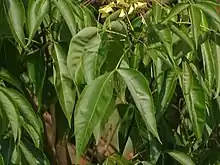Crateva nurvala
Crateva nurvala is an accepted name for a small tree in the genus Crateva and the family Capparaceae.[1][2] However, the Catalogue of Life lists this as a synonym of C. magna.[3]
| Crateva nurvala | |
|---|---|
| Scientific classification | |
| Kingdom: | Plantae |
| Clade: | Tracheophytes |
| Clade: | Angiosperms |
| Clade: | Eudicots |
| Clade: | Rosids |
| Order: | Brassicales |
| Family: | Capparaceae |
| Genus: | Crateva |
| Species: | C. nurvala |
| Binomial name | |
| Crateva nurvala Buch.-Ham. | |
| Synonyms[1] | |
| |
Distribution
The small wild or cultivated tree is widespread from India to Southeast Asia, south of China. It grows lowlands to an altitude of 1,000 m (3,300 ft) above sea level. It occurs on glades, at the edge of a forest, near rivers and lakes, etc.
Traditional medicine
The dried bark is used raw drug in traditional systems of medicine in India such as Ayurveda and Siddha.[4]



References
- "The Plant List: A Working List of All Plant Species". Retrieved 1 April 2017.
- The International Plant Names Index
- Roskov Y.; Kunze T.; Orrell T.; Abucay L.; Paglinawan L.; Culham A.; Bailly N.; Kirk P.; Bourgoin T.; Baillargeon G.; Decock W.; De Wever A. (2014). Didžiulis V. (ed.). "Species 2000 & ITIS Catalogue of Life: 2014 Annual Checklist". Species 2000: Reading, UK. Retrieved 26 May 2014.
- Bhattacharjee, Atanu; Shashidhara, Shastry Chakrakodi; Aswathanarayana (2012). "Phytochemical and ethno-pharmacological profile of Crataeva nurvala Buch-Hum (Varuna): A review". Asian Pacific Journal of Tropical Biomedicine. 2 (2): S1162–8. doi:10.1016/S2221-1691(12)60379-7.
External links
 Data related to Crateva at Wikispecies
Data related to Crateva at Wikispecies- India Biodiversity
This article is issued from Wikipedia. The text is licensed under Creative Commons - Attribution - Sharealike. Additional terms may apply for the media files.